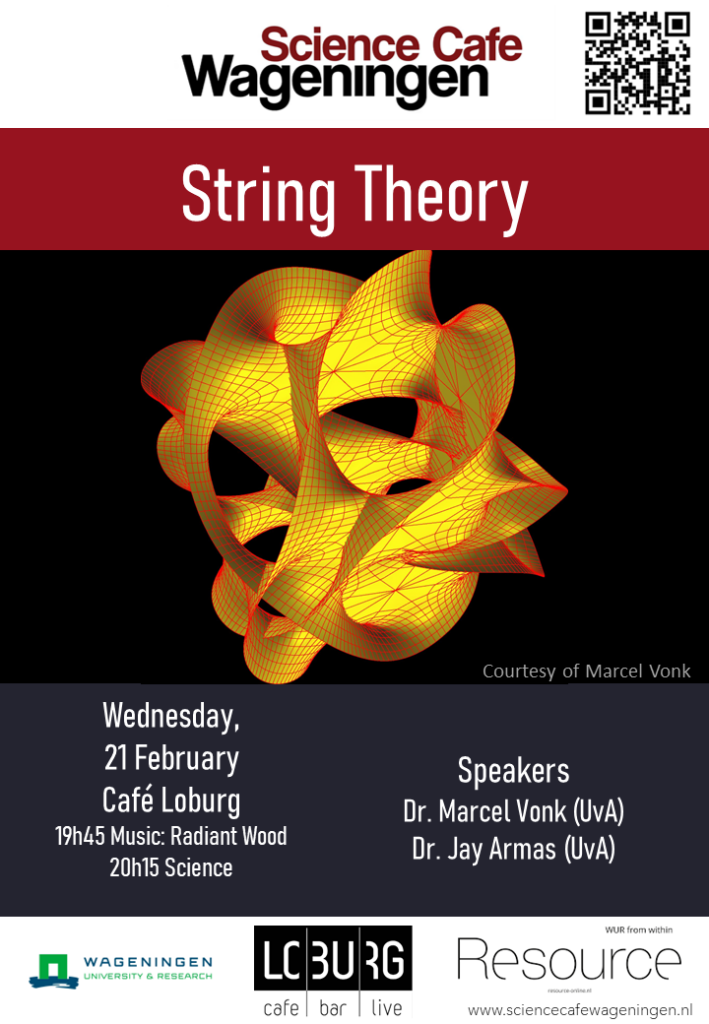
Wednesday February 21th
19:45 live music: Radiant Wood
20:15 speakers
Café Loburg
Over the years, physicists have become better and better at describing the world – including what happens at scales either much larger or much smaller than the ones we encounter in our daily lives. Albert Einstein’s theory of general relativity explains to us what happens in the cosmos, in particular when gravity is involved. Quantum mechanics tells us how the tiny particles that we are made of behave. However, these two theories – both over a century old – do not get along, and physicists still have a hard time combining them and truly understanding concepts like black holes or the Big Bang. String theory is an attempt to solve this dichotomy. Dr. Vonk will explain what string theory is, why we need it, and why half a century after its invention, there are still many things to be learned about this surprising theory of quantum gravity.
String theory has had a tremendous success in complementing our understanding of many parts of physics including black holes, fluid dynamics, heavy-ion collisions, and cosmology. Many of these insights are based on the notion of holography in which theories with gravity are related to theories without gravity. Dr. Armas will highlight and explain why many of these successes suggest that string theory is not only a theory of quantum gravity but also a tool to understand physics emerging at different spatial scales. If time permits, he will contrast string theory with other approaches to quantum gravity.
Dr. Marcel Vonk is an assistant professor in mathematical physics at the University of Amsterdam. He develops mathematical techniques that physicists can use to better understand the quantum world, and studies simple mathematical models that approximate the complicated physics of the smallest building blocks of our world. He obtained his PhD in Amsterdam in 2003, under the supervision of Erik Verlinde and Robbert Dijkgraaf, and after that was a researcher around the world, in Sweden, France, South Africa, Portugal and Spain, before returning to Amsterdam in 2012. Besides his research he writes popular science books, is the editor-in-chief of the Quantum Universe popular science website, and is an avid tournament poker player.
Dr. Jácome (Jay) Armas is an assistant professor at the University of Amsterdam, Institute of Physics, and coordinator of the Dutch Institute for Emergent Phenomena. He studied at Trinity College Dublin as well as KU Leuven and completed his masters at the University of Cambridge. Following a PhD at the Niels Bohr Institute in Copenhagen, he held postdoctoral positions at the University of Bern and Université Libre de Bruxelles. Armas holds degrees in engineering, mathematics, philosophy and theoretical physics.
His research currently focuses on different aspects of string theory, black holes and fluid dynamics with applications to high-energy physics, astrophysics, hard, soft and biological matter. The connecting thread of his research is the application of string theory methods and techniques to solve problems in other areas of physics. He likes, in particular, to think about black holes in extra spacetime dimensions and the shapes that they can take. In addition to his research activities, Armas established Science & Cocktails, the international science outreach platform and event series. He is involved in various science outreach initiatives ranging from dance performances, through theatre plays, to art installations.
His new book, Conversations on Quantum Gravity, compiled over more than 10 years of mainly in-person interviews, is his gift to the physics community. The book addresses the question: how far are we from a theory of everything that combines all the forces of nature, including gravity? It’s a unique, readable overview that provides a gateway into cutting edge research for students and others who wish to engage with the open problem of quantum gravity.
